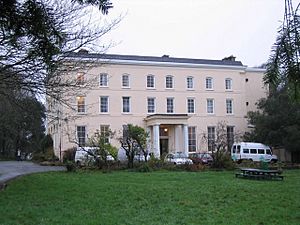Sir Arthur Owen, 3rd Baronet facts for kids
Sir Arthur Owen, 3rd Baronet (born around 1674 – died 1753) was an important Welsh politician. He came from Orielton, a place in Pembrokeshire, Wales. Sir Arthur was a member of the Whig political group. He served in the British Parliament, first in the English House of Commons and later in the British House of Commons, from 1695 to 1727.
Contents
Early Life and Family Connections
Sir Arthur Owen was the oldest son of Sir Hugh Owen, 2nd Baronet and his wife, Anne Owen. His family lived at Orielton, Pembrokeshire.
Around 1697, Sir Arthur married Emma Williams. Her father was Sir William Williams, 1st Baronet, who was also a Member of Parliament (MP). When his father passed away in 1699, Arthur became the 3rd Baronet and inherited the family estate.
Sir Arthur's Political Journey
Sir Arthur's family had a lot of influence in politics, especially in the Pembrokeshire area. They were known as moderate Whigs, which meant they were a political group that supported more power for Parliament and less for the King.
Starting in Parliament
In 1695, Sir Arthur became a Member of Parliament for Pembrokeshire. He took over this role from his father without anyone running against him. In 1697, he also became a Captain in the Pembrokeshire Militia Horse, which was a local military group.
He was re-elected to Parliament in 1698. In 1701, he faced a challenge but won by a large number of votes. He was then re-elected without opposition in 1701 and 1702.
Taking a Break and Returning
In 1705, Sir Arthur stepped aside from Parliament for a short time. His brother took his place as MP. During this period, Sir Arthur served as the Mayor of Pembroke for three years (1705, 1706, and 1707). As Mayor, he helped increase the number of people involved in the local council.
Because of his work as Mayor, he was elected as MP for Pembroke Boroughs in 1708 without any opposition. As a Whig, he supported certain laws, like allowing people from other countries (Palatines) to become British citizens. He also voted to impeach (accuse of wrongdoing) a person named Dr. Sacheverel in 1710.
Later Years in Parliament
In 1710, Sir Arthur ran for Parliament in both Pembrokeshire and Pembroke Boroughs. He lost in Pembrokeshire but won in Pembroke Boroughs. However, he was later removed from his seat in 1712 after a special request (a petition) was made.
In 1715, Sir Arthur was given an important job as Lord Lieutenant of Pembrokeshire. This role meant he was the King's representative in the county. He also regained his seat as a Whig MP for Pembrokeshire in the 1715 election. In 1716, he became Vice-Admiral of North Wales, which was a naval position.
He was re-elected for Pembrokeshire in 1722. However, he lost his seat in the 1727 election and did not run for Parliament again after that.
Death and Family Legacy
Sir Arthur Owen passed away on June 6, 1753. He was buried in Monkton, Pembrokeshire. He and his wife had many children, including six sons and six daughters.
His son, William, became the 4th Baronet and also served as an MP. Another son, John, also became a Member of Parliament, continuing the family's political tradition.
 | Mary Eliza Mahoney |
 | Susie King Taylor |
 | Ida Gray |
 | Eliza Ann Grier |


